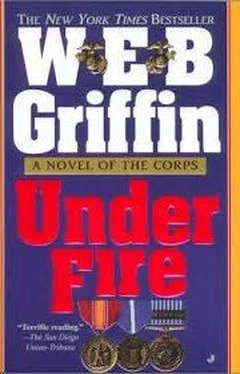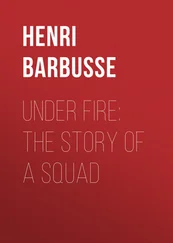Griffin W.E.B. - The Corps 09 - Under Fire
Здесь есть возможность читать онлайн «Griffin W.E.B. - The Corps 09 - Under Fire» весь текст электронной книги совершенно бесплатно (целиком полную версию без сокращений). В некоторых случаях можно слушать аудио, скачать через торрент в формате fb2 и присутствует краткое содержание. Год выпуска: 0101, Жанр: Старинная литература, на английском языке. Описание произведения, (предисловие) а так же отзывы посетителей доступны на портале библиотеки ЛибКат.
- Название:The Corps 09 - Under Fire
- Автор:
- Жанр:
- Год:0101
- ISBN:нет данных
- Рейтинг книги:5 / 5. Голосов: 1
-
Избранное:Добавить в избранное
- Отзывы:
-
Ваша оценка:
- 100
- 1
- 2
- 3
- 4
- 5
The Corps 09 - Under Fire: краткое содержание, описание и аннотация
Предлагаем к чтению аннотацию, описание, краткое содержание или предисловие (зависит от того, что написал сам автор книги «The Corps 09 - Under Fire»). Если вы не нашли необходимую информацию о книге — напишите в комментариях, мы постараемся отыскать её.
The Corps 09 - Under Fire — читать онлайн бесплатно полную книгу (весь текст) целиком
Ниже представлен текст книги, разбитый по страницам. Система сохранения места последней прочитанной страницы, позволяет с удобством читать онлайн бесплатно книгу «The Corps 09 - Under Fire», без необходимости каждый раз заново искать на чём Вы остановились. Поставьте закладку, и сможете в любой момент перейти на страницу, на которой закончили чтение.
Интервал:
Закладка:
"Are you coming, or not?"
She climbed into the backseat.
"Okay, Ernie," McCoy ordered. "Let's go."
Five minutes later, Miss Jeanette Priestly, accredited war correspondent of the Chicago Tribune, leaned forward and asked, "What happened to the other fellow? The Trans-Global captain? Who set the speed record?"
"I expect about right now Major Malcolm S. Pickering, USMC Reserve, is trying to come up with a good excuse to get out of being mobilized," McCoy said.
Zimmerman laughed.
[TWO]
HEADQUARTERS, 34TH INFANTRY REGIMENT
24TH U.S. INFANTRY DIVISION
NONSAN, SOUTH KOREA
1530 15 JULY 1950
It had not proved hard to find the headquarters of the 34th Infantry Regiment, although the best location of it Captain McCoy had been able to extract from an S-3 sergeant at 24th Infantry Division headquarters had been rather vague:
"I think it's probably here, Captain," the sergeant had said, pointing to a map. "On Route One, a little village called Nonsan. That's where it's supposed to be."
Nonsan turned out to be a typical small Korean town, a collection of thatch-roofed stone buildings surrounding a short, sort of shopping strip of connected two-story, tin-roofed buildings, two of which, according to a plywood sign, had been taken over by "Hq 34th Inf Regt."
The officer standing outside one of the stores-probably the regimental commander; there was a white colonel's ea-gle painted on his helmet-looked, McCoy thought, a lot like the motor officer at Headquarters, Eighth Army.
Not only was he a portly man armed with a.45 ACP pis-tol, his fatigue jacket sweat-stained under his armpits, and with a sweaty forehead, as the major had been, but from the moment he had seen the Jeep, it was clear he was not at all pleased at what he saw.
McCoy pulled the Jeep in beside two other Jeeps and a three-quarter-ton truck, and got out.
"Stay in the Jeep," he ordered, then walked up to the colonel and saluted.
The colonel returned the salute.
"Who's the woman?" the colonel asked.
"Miss Jeanette Priestly, of the Chicago Tribune, sir," McCoy replied.
The colonel motioned for McCoy to precede him into the building, and when they were both inside, asked, dis-gustedly, "What's she doing here?"
"She's an accredited war correspondent, sir, with orders permitting her to go wherever she wants to go."
"Jesus H. Christ!" the colonel said. "With two body-guards, right?"
"Not exactly, sir," McCoy said. "May I show you my or-ders?"
The colonel gestured impatiently for McCoy to hand them over. McCoy gave him the Dai-Ichi orders. The colonel read them and handed them back.
"Marines, huh? I thought your fatigues were a little odd."
"Yes, sir."
"Okay, Captain McCoy of the Marine Corps, what ex-actly is your mission, except for escorting a female-who has absolutely no business being here-around?"
"We've been sent here, sir, to see what's going on."
"By who? General Almond himself?"
McCoy didn't reply.
"That was a question, Captain," the colonel said, sharply.
"Sir, we work for General Pickering."
Almost visibly, the colonel searched his memory for that name, and failed.
"He's in the Dai Ichi Building?"
"Yes, sir."
"So what is your connection with the lady?"
"When Eighth Army couldn't give us a Jeep, sir, I com-mandeered hers."
"And brought her along with you?"
"Yes, sir."
"Well, Captain, she's your responsibility. I don't want to be responsible for her safety. Not that I could if I wanted to."
"Yes, sir."
"You want to `see what's going on'? Presumably you somehow intend to relay what you see to your boss-Gen-eral Pickering, you said?"
"Yes, sir."
"I don't have any communications that will permit you to do that, and I would be surprised if division does."
"Yes, sir."
"But it has just occurred to me," the colonel said, some-what bitterly, "presuming you can find someway to com-municate with the Dai Ichi Building, that it might be a very good thing for our senior officers to learn `what's going on' here. Come with me, Captain, and I'll tell you what I know about `what's going on.'"
"Yes, sir. Thank you, sir."
The colonel turned and walked farther into the long and narrow building, which, judging from the shelves on both walls, had been a store of some kind or another.
There were the usual officers and enlisted men, and then-equipment, of a regimental headquarters crowding the room, and the colonel had apparently elected to put his field desk at the far end, where there was another door.
As McCoy followed the colonel between the desks and around the field telephone switchboard and radio sets, he glanced into a side room.
In it were three North Korean soldiers, wearing insignia that identified them as a sergeant, a corporal, and a private. They were seated with their backs against a wall. A ser-geant with an Ml carbine sat on a folding chair, guarding them.
"Colonel," McCoy called. "Excuse me, Colonel."
The colonel looked impatiently over his shoulder. By then, McCoy had gone into the room.
"God damn!" the colonel said, and went after him.
The sergeant looked at McCoy curiously.
"Get to your feet when an officer enters a room, Sergeant!" McCoy snapped unpleasantly.
The sergeant did so with very little enthusiasm.
The colonel appeared at the door, his mouth open to speak.
McCoy spoke first. He pointed at the North Korean pri-vate.
"That applies to you, too," he said, nastily, in Korean.
The private looked for a moment as if he was going to stand, but then relaxed against the wall.
"On your feet, all of you," McCoy barked, in Korean.
They all stood up.
"Have you eaten?" McCoy asked. "Do you need water?"
The North Korean sergeant said "water" in Korean.
The private glowered at him.
"Colonel," McCoy said, "the private of the 83rd Motor-cycle Regiment, the one with the good leather boots, is al-most certainly an officer, and very probably speaks English. Most of the officers of the 83rd do. I will speak with him, with all of them, after your sergeant gets them water, rations, and some cigarettes."
The colonel looked at McCoy for a long moment, then turned to the sergeant.
"You heard the captain," he said. "Get a canteen and a box of C-rations in here."
McCoy took the sergeant's carbine from him and held it on his hip, like a hunter, until the sergeant returned with two canteens and a box of C-rations.
He set the box on the floor, and tried to hand one of the canteens to the North Korean sergeant. He shook his head, "no."
"Take the water," McCoy ordered in Korean. "You are all prisoners. I give the orders here, not your officer."
The sergeant looked at the private, then took the can-teen.
"Bingo," McCoy said, very softly, to the colonel, handed the American sergeant his carbine, and walked out of the room.
He walked out of earshot of the room, then stopped.
"You speak Korean. I'm impressed," the colonel said.
"Are they your prisoners, sir? Or did you inherit them?"
"My third battalion captured them," the colonel said. "Division was supposed to send for them-take them for interrogation...."
"They're from the 83rd Motorcycle Regiment," McCoy said. "They're pretty good. The regimental commander is-the last I heard, a Colonel Pak Sun Hae, who used to be a lieutenant in the Soviet Army. They're well trained, and well equipped."
"Which is, sadly, more than I can say about the 34th In-fantry," the colonel said.
"Colonel, for my purposes-it would make them even more uncomfortable than they are-I'd like Miss Priestly to take their picture. Would that be all right?"
The colonel thought that over.
"Why not?" he said, after a minute, and turned to a master sergeant standing nearby. "There's a lady and a Marine in a Jeep outside, Sergeant. Would you ask them to come in, please?"
Читать дальшеИнтервал:
Закладка:
Похожие книги на «The Corps 09 - Under Fire»
Представляем Вашему вниманию похожие книги на «The Corps 09 - Under Fire» списком для выбора. Мы отобрали схожую по названию и смыслу литературу в надежде предоставить читателям больше вариантов отыскать новые, интересные, ещё непрочитанные произведения.
Обсуждение, отзывы о книге «The Corps 09 - Under Fire» и просто собственные мнения читателей. Оставьте ваши комментарии, напишите, что Вы думаете о произведении, его смысле или главных героях. Укажите что конкретно понравилось, а что нет, и почему Вы так считаете.










